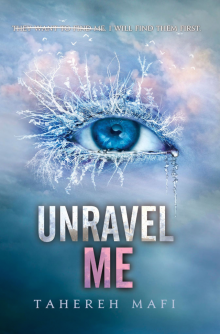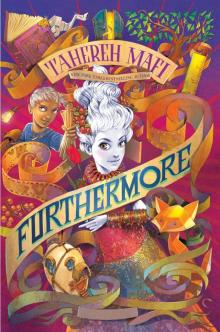- Home
- Tahereh Mafi
Whichwood Page 15
Whichwood Read online
Page 15
It was just then that Laylee heard someone call her name.
She stumbled up to her feet, wild-eyed, at the sound of Baba’s voice, and spun around in search of him. She felt her heart leap up into her throat until she was sure she would choke on it, fear and happiness erupting within her. Baba had come home.
Baba had come home.
At first, all she saw was his face. All she heard was the thrumming in her head; all she felt was the impossible stillness of the air around her. Her mind had gone thick and muddy, so strange and dense she could rake her fingers through it as she clawed her way toward him. She wanted answers, she wanted to be angry, she wanted to hit him, she wanted a hug.
Baba was here. And at first, that was all she saw.
She did not question why his hands were hidden behind his back. She did not see the Town Elders congregated behind him. She couldn’t feel Oliver tugging at her arm. She didn’t hear Alice suddenly scream. She wouldn’t notice Benyamin and his mother duck out of sight without a word, too decent to stick their noses in Laylee’s business.
Baba was standing in front of her, and at first this was all that mattered.
What happens next is difficult to relay.
Laylee still can’t speak of this time in any measure of detail, so I will endeavor to piece together as comprehensive a summary as I’m able:
The Whichwood Elders had descended upon Laylee’s home at first light, determined to finally put an end to the mordeshoor business. They did not see Laylee’s work as even the smallest kind of success, you see. They saw the events of the evening prior as a terrible wake-up call—a horrifying reminder of the dangers of relying upon mordeshoors. The Elders had long felt that this, the work of the mordeshoor, was an outmoded system for dealing with the dead—it was an ancient ritual they’d held on to for simple reasons of maintaining tradition. Most other magical lands had long ago dispensed with traditional methods of dispatching the dead; they’d enacted new measures, overruled the old magic with more modern magical systems. Mordeshoors were near extinction, after all, and Laylee Layla Fenjoon—who, after Baba, would be the last of her line—was already widely considered to be terrible at her job.
The Town Elders had decided that someone had to be held accountable for last night’s devastation. What Laylee saw as a difficult save of a terrible evening, the town saw only as ruination. Four innocent people had died. Many more had been stripped of their flesh in front of their own children while insects rampaged said flesh without permission; ghosts had scandalized the city into mass chaos, and scores of people had been so traumatized by the ordeal that they’d been rushed to the hospital. The people were outraged and terrified—a lethal combination for an angry mob—and in their blind rage, they were demanding justice. Someone was to pay for the sins of the evening, and Laylee, at only thirteen years old, was deemed too young.
Baba had been sentenced to death.
He’d let this happen, they’d decided. He’d abandoned his post to a child, and the entire system had fallen apart. It was his fault that the people of Whichwood had been compromised and four of them had been killed mercilessly in the street. It was Baba’s fault that Laylee had been so overworked. It was Baba’s fault for putting the town in danger—for being so irresponsible—and he would be punished for it.
The Elders had found the alleged criminal sitting in a tree, eating a sheaf of paper. They’d bound him and brought him before his daughter because he was allowed one concession before his impending death: to be able to say good-bye to his loved ones. And so here he was, so thin and scraggly Laylee hardly recognized him, and he stared at her, a little happy and a little confused, and smiled.
Laylee closed her eyes.
She would not stir; she would not breathe or bat an eyelash; she would not speak; she would not cry or gasp or ever, ever be moved from this spot. She froze because she hoped that the world would freeze, too, that time would fall over and crush her, that if she simply waited long enough, this pain could all be undone.
“Laylee joonam,” Baba said. “Azizeh delam.”
Tears welled up in her heart, her throat, her pockets.
“Azizam,” Baba said again. “Azizam, please look at me.”
Finally, she felt her mouth move. The seam of her lips had gone dry; her jaw throbbed in her skull. “I will not,” she whispered.
She heard the sound of metal—a key? A few clicks. The distinct sounds of manacles clanging open and closed.
And then—
A warm hand against her face.
Laylee opened her eyes, tears streaming down her cheeks. She wore no expression as her heart exploded in her chest, as her father stood before her and said, “Laylee, I finally found him.”
“No,” she tried to say. “No,” but it wouldn’t come out.
“He finally came to me this morning,” Baba said, all gums and glittering eyes, “and told me we’d speak soon.”
Laylee felt her limbs grow thick and heavy, her veins knotting under her skin.
“I told you,” said Baba, smiling, “I told you I’d find him, azizam.”
He was talking about Death, of course. Baba had left two years ago to find Death and had never returned. It was his great mission—to find the creature responsible for taking his wife. And now Death had promised him an audience, and Baba couldn’t understand why.
Everything happened very quickly after that.
The Elders dragged Baba away, telling Laylee that she could visit him in his cell just before his public humiliation later that evening. He would stand in chains before a crowd as a very dark magic reached into his chest and disintegrated the heart beating within him. It was a simple procedure, they’d said. Shouldn’t be too painful, they’d said. They assured her he would be dead before sunset.
Laylee nodded without meaning to—wondering all the while what had compelled her to do so—and looked at no one and nothing as her life was dismantled before her. The decision to sentence Baba to death had not only been made quickly and without ceremony, it had been pushed through as an emergency ruling in favor of an angry mob demanding justice. This, the execution of her father, was done as a supposed kindness to Laylee, because after Baba was dead, Laylee’s punishment would be far less severe: she would be put on trial for treason.
“Once the anger of the people has been sated with the blood of your father, they might be willing to listen to your cause,” she remembered someone saying to her.
She was told she’d be given an opportunity to defend herself, her actions, and the necessity of her profession in court, but that this was not a guarantee of anything. If the jury ruled in favor of the people, Laylee’s entire purpose as a magical person would shatter, and there was nothing she could do about it. It was a clause—a protection in the old magic—that, in the case of danger or disaster, the results of a proper court trial could overturn ancient magical tradition. It was a judicial process that had never before seemed threatening.
But now?
Laylee had gone numb in parts of her face.
Alice and Oliver were by her side, holding her upright, and though both Alice and Oliver say they tried to hug her, to speak to her—to offer words of comfort—Laylee claims she heard nothing.
You might now be wondering why none of the children had tried to stop the Elders from taking Baba—after all, together they could do quite a bit of powerful magic—and you’d be well within your right to wonder. But the situation with Baba was much more complicated in the moment than it might have seemed. It all happened so quickly—and it was such a shocking revelation—that it had rendered the group of them temporarily impotent. Suddenly, in the face of a towering group of powerful and angry Elders, Alice and Oliver and Laylee felt fully their age—too young and too old all at once. Laylee felt small. She remembers feeling scared.
She remembers sitting somewhere inside of her house.
She remembers walking in, somehow, and she remembers Maman screeching at her. “Where have you been? I was worried sick! Who was that out there? Who are these children you’ve brought into our home? Laylee—Laylee—”
She remembers the birds tapping at her windows, their sharp beaks pecking ceaselessly, and she remembers someone reaching into her chest and ripping out her heart, and she remembers exhaustion, she remembers blurriness. And there was something else; she remembers something else, too—
“Oh, no!” Alice gasped, reaching for Oliver’s arm.
“What is it?” he hissed, wrenching his arm away from her. “You’re cutting off my circulation, Alice, good grief—”
“Father is here.”
Oliver Newbanks jumped two feet in the air. His first thought was to hide, but there was no time. It seemed a perfect coincidence that Alice had looked out the window at precisely the right moment to see her father strolling up to the door of Laylee’s castle, but the fact that Father was here was far from fortuitous. Father’s arrival in Whichwood could only mean that Alice and Oliver had ruined everything. The thing was, Ferenwood parents never came to collect their children in the middle of a task—not even in the face of failure. It was up to the children to deal with the tasks on their own. That Father had come to fetch Alice meant that she was in very, very deep trouble. (And Oliver, who’d run away from home to accompany her, was about to be caught and thoroughly punished.)
Laylee doesn’t remember much more than this.
She doesn’t remember meeting Alice’s father; she doesn’t remember his condolences or his assurances that he’d tried desperately to convince the Whichwood Elders to change their minds. She doesn’t remember his offer to take her away with them to Ferenwood.
She remembers staring at a wall.
She remembers, vaguely, the terrified look on Oliver’s face. She remembers him taking her hand; she remembers staring at his fingers as he said good-bye.
She doesn’t remember Alice and Oliver leaving.
Laylee cannot remember what anything else looked like that afternoon. She says she sat down and did not move or even cry. She says the hours she spent waiting for Baba to die were the longest hours she’s ever lived. And though she went to see her father later that evening, she cannot remember how her feet got her there.
Baba was not unhappy when he died.
Laylee watched him as he waved at her, a deep resignation rounding his shoulders. He was lost in conversation just before it happened, speaking animatedly with a spirit no one but she and he could see. Death stood beside him, gentle and tall, and held Baba close as Baba’s eyes went wide and—with a sudden, choking gasp—he lost the ability to speak. Only then did Death finally, patiently, answer all of Baba’s questions.
Not long before it ended, Baba smiled.
Laylee watched on silently, stone-faced, as her father’s knees buckled, his body folding into itself like a series of closing doors. She would not speak, not even as her skin seemed to turn inside out in agony. She didn’t shed a single tear as the people booed and threw old food at the broken body of a man who’d raised her on a diet of honey and poetry. She would not betray a single emotion as the mob shouted obscenities at her, as they rushed around her, yanking at her cloak, making fun of her bones, spitting on her boots and bloody clothes.
She wouldn’t miss a moment of her father’s last day.
This, she would remember.
Just before, Baba had held her hand through the bars of his cell and cried. He said, “Laylee it’s happening—he’s near—can you feel him?”
“Yes, Baba,” she’d whispered, squeezing his fingers. “He’s just outside.”
“You saw him?” Baba said anxiously. “What did you think?”
“He seems kind and very sad,” said Laylee. “But I think he likes you.”
Baba beamed and sat back on his bench, eyes filled with wonder.
No one spoke for a while after that. Baba was lost in his thoughts, and Laylee was just—lost. Untethered.
Finally, Baba said, “He said he would take me to your mother.”
Laylee looked up.
Baba’s eyes had filled with tears. “It would be so good to see her,” he said, choking on the words. “Heaven knows, I miss her so much. I miss her every day.”
And Laylee fought back a wave of pain so unbearable it nearly took her breath away.
Had he not missed her?
Laylee had been at home, quietly surviving and hardly alive all these years he’d been gone, and her father had never returned. She did not seem to be enough—she knew now that Baba would never love her as much as he loved her mother—and she felt the pain of this realization torch a path down her throat, unshed tears singeing the whites of her eyes.
Oh, reader, if only you knew how dearly Laylee loved him—if only you could understand how she adored this flawed, broken man who knew not how to father. She’d loved him in spite of himself; she’d loved him for reasons impractical and unreasonable. She’d loved, you see, and loving was an action nearly impossible to undo, and so, with her broken heart she grieved: first, for herself, for the child whose parent loved his spouse more than his kin, and second, for Baba, for the man who’d lost his way, his self, and the love of his life too soon.
The guards came, then. Baba’s time was up.
Laylee grabbed for him one last time, a desperate attempt to hold him here, in this world, where even she knew he no longer belonged. Baba was so calm. He took her little hand in his and smiled his big, gummy smile. He then reached into his pocket and poured, into her outstretched hand, the remainder of his teeth.
Laylee looked at him.
“If you plant them, they will grow,” was all he said, and closed her fist around the gift.
In the end, the guards were forced to drag her away.
She does not remember screaming.
Now Death had fallen to his knees and wrapped his arms around her father’s withered limbs the way a parent might comfort a child—it was a tender, careful gesture, an embrace that begged the body to be unafraid. And when Laylee saw the final breath leave her father’s lungs, she froze.
Laylee Layla Fenjoon was still a mordeshoor, after all. She watched, with bated breath, as Baba’s spirit separated from his skin. She knew that soon—very soon—he would follow her back to the castle, so she turned suddenly on her heel, her red cloak whipping around her in a perfect circle, and walked tall, shoulders back, head held high even as screams built homes inside her, and headed in the direction of home.
The Elders had promised to send Baba’s body back to her, which meant that tonight she would prepare a coffin for her father.
Maman had not bothered to say good-bye.
In fact, Maman had not said anything at all to her after Baba arrived in the castle. She and Baba were so overjoyed to have found each other again that Laylee, who had come to accept the unpalatable truth that her parents had loved each other far more than they’d ever loved her, could no longer find the energy to be upset. Maman and Baba were finally at peace, and Laylee could see now that it was not that they did not like her—it was just that their own happiness was so large it had left little room in their hearts for others. So when Laylee awoke the next morning to perfect silence, she knew, instinctively, that Maman had followed Baba into the Otherwhere. The wailing spirit was gone—which meant the book of her mother’s life had finally, peacefully closed—and Laylee, who was too close to death to ever purposely misunderstand it, was running out of excuses to be angry.
For years Maman’s rampages had given Laylee daily ammunition to be irritated, Baba’s carelessness had given her ample reason to feel furious and entitled, and her work—her life’s work—had afforded her every opportunity to stew in bitterness and resentment.
But now?
There were no ghosts, no corpses, no parents or strange friends, no ill
nesses to worry about. Laylee looked ahead and saw a black, gaping nothingness stretch out before her, and the immensity of it—the overwhelming grasp of it—threatened to devour her.
It was then that Laylee fell to her knees and felt her chest split open.
Sobs ripped through her body with a raw, ferocious pain unlike any she’d ever allowed herself to experience. She sobbed until she couldn’t breathe, until her eyes had swollen shut, until her throat had gone raw from gasping, until her body had run out of tears. She had finally allowed herself to feel the pain she’d hidden from herself all these years, and she grieved, she grieved for the life she’d had, for the life she’d lost, for the years she’d wasted being inward and angry, for the friends she could’ve had, for the job she should’ve cherished—
Oh, she missed it all desperately.
In the end, it was the weight of a single truth that finally broke her:
Reader, she had been ungrateful.
COME, LET’S LEAVE THIS PLACE FOR A BIT
Oliver Newbanks could not be consoled.
Alice had tried and failed, repeatedly, to console him, and her failure to do so should come as a surprise to no one, given the fact that Alice had been crying hysterically as she attempted to reassure the boy, through hiccuping sobs, not to worry. Father, too, could not be moved to console Oliver Newbanks, as he was still busy being terribly disappointed in the both of them.
So it is here that we come to pivot again in our story:
Here, on an underwater elevator moving at such a clip as to be concerning; here, as Oliver Newbanks sits quietly with his head bowed and his hands clasped between his legs. This underwater elevator is new, an intentionally kept secret recently uncovered; instead of the usual five-day sojourn, their trip home will take only two. Alice and Oliver find even this truncated length of time abhorrent, and the modern comforts of the shiny transport go unappreciated by those who occupy its interior. They’ve been traveling for just under twenty-four hours now and Alice’s attentions are still focused on her incessant weeping; Oliver, on the other hand, has squeezed his eyes shut, his vision clouded by anger and heartbreak; Father, whose age has armored him against the dangers of needless overexcitement, can only bring himself to occasionally interrupt his daughter’s histrionics long enough to sigh and pat her knee.

 Shatter Me
Shatter Me Restore Me
Restore Me Destroy Me
Destroy Me Unravel Me
Unravel Me Ignite Me
Ignite Me Defy Me
Defy Me Fracture Me
Fracture Me Shadow Me
Shadow Me Whichwood
Whichwood Reveal Me
Reveal Me Furthermore
Furthermore Shadow Me (Shatter Me Novella)
Shadow Me (Shatter Me Novella) Believe Me
Believe Me Restore Me (Shatter Me)
Restore Me (Shatter Me) Imagine Me
Imagine Me An Emotion of Great Delight
An Emotion of Great Delight Find Me
Find Me A Very Large Expanse of Sea
A Very Large Expanse of Sea Unravel Me: The Juliette Chronicles Book 2
Unravel Me: The Juliette Chronicles Book 2